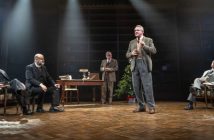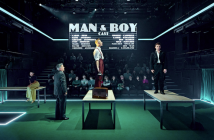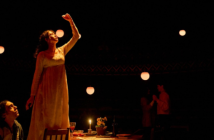The Scottish play. In Shakespeare’s home town. By the RSC. As bankable as it gets on any day, and yet this performance, though scattered with moments of brilliance, ultimately falls short for anyone who enjoys a degree of subtlety to one of the Bard’s most tortured protagonists.
Director Polly Findlay has elected for a modern setting – so you’ll forgive the anachronistic swords given soldiers in 21st century battle fatigues – and the psychological tension is riven with heavy use of dramatic audio-visual devices via projected quotes and timelines alongside more customary horror-esque lighting and distorted sound. Of all these, perhaps the most tension-ratcheting is the digital clock that appears when Macbeth’s fate is sealed, counting down to his eventual demise. Alas, clever as an idea it might have been when conceived, it unfortunately better serves to remind us how much we have left to endure.
Its greatest surprise – and horror trope – if you’ll forgive the spoiler, comes at the outset: in this version the witches are played by children. They are themselves excellent in the roles, and one can see what Findlay is trying to achieve, but ultimately much of these scenes miss the mark, conveying a kitsch 1970s horror sentiment in place of what should be sinister and unnerving.

It is not the AV nor the children that are the primary challenge in this production, however, but the protagonist that is the root of the issue. Christopher Eccleston, normally the go-to when drama needs an injection of potency, in his RSC debut, seemed unable to dial down his performance from one of perpetual intensity to any form of tortured subtlety. As a result his performance always feels overwrought and bringing the play down to a level that reminded me more of a polished school production. If this sounds unfair, don’t take my word for it, but mark the polite comment I overheard as I left, “He played it very externally; I would have liked to have seen more of the internal anguish intended for the character.”
Carrying a play certainly brings pressure, particularly when you’re the main draw, and while the stage may be an unfamiliar environment over the screen, one can be sympathetic. Which is why it’s fortunate there are many other merits in this production. In particular, the salvation is that Eccleston is surrounded by several superior performances from the company – Michael Hodgson delivers the Gate Porter’s comic relief with perfection, Banquo (Raphael Sowole) on returning as the ghost is perfectly pitched in his impotent anger,  Luke Newberry as Malcolm gives as good a rendition of how to deliver Shakespeare as any I’ve seen, and Macduff (Edward Bennett) on hearing that his entire family has been killed delivers his anguish in perfectly paced pentameter, his breathing conveying as much as his words. There’s anticipation, too, for Niamh Cusack at Lady Macbeth, and her running around in her sleep ridden with guilt is convincing enough, though she is prone to a touch of the Ecclestons when bouncing off Macbeth in their scenes together.
Luke Newberry as Malcolm gives as good a rendition of how to deliver Shakespeare as any I’ve seen, and Macduff (Edward Bennett) on hearing that his entire family has been killed delivers his anguish in perfectly paced pentameter, his breathing conveying as much as his words. There’s anticipation, too, for Niamh Cusack at Lady Macbeth, and her running around in her sleep ridden with guilt is convincing enough, though she is prone to a touch of the Ecclestons when bouncing off Macbeth in their scenes together.
Thus it is with my own hand-wringing angst that I pen this; for it’s a version of Macbeth that has enough moments to make it worthwhile to see, and as ever the setting in Stratford is a joy, but it’s just a shame that our eponymous lead seemed unable to deliver to expectations. If only there had been less of Macbeth in this performance, it could have been so much better.
MacBeth runs at the RSC theatre, Stratford-upon-Avon, until 18th September 2018, and continues at London’s Barbican theatre from 15th October 2018 to 18th January 2019. For more information, and to book tickets, visit www.rsc.org.uk. The production will also be broadcast live in UK cinemas on 11th April 2018.
Photos by Richard Davenport ©RSC




